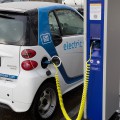 The National Science Foundation (NSF) and Sen. Harry Reid (D- Nev.) announced a $20 million grant for the Nevada System of Higher Education to study how to improve solar power facilities.
The National Science Foundation (NSF) and Sen. Harry Reid (D- Nev.) announced a $20 million grant for the Nevada System of Higher Education to study how to improve solar power facilities.
The Nevada Senate newsroom called the research project “The Solar Energy-Water-Environment Nexus in Nevada.” Its goal is to improve the efficiency of solar panels and minimize the amount of “environmental degradation” at solar plants.
In the announcement, which appeared on his website, Reid said the research will help communities improve clean energy practices both in Nevada and outside the state. “By bringing together the greatest minds in Nevada, we can overcome obstacles that hamper clean energy development in Nevada,” he says.
The grant will be used to fund education and research in Nevada’s schools. For research purposes, it will provide five years of funding to employ technicians and faculty at the University of Nevada, Reno; the University of Nevada, Las Vegas; and the Desert Research Institute. Another portion of the money will be used to encourage K–12 students to develop career goals in the fields of science, technology, engineering and mathematics — called the STEM fields.
Dr. Gayle Dana, the Project Director at National Science Foundation’s EPSCoR program, said in the news release that the research funds will help scientists learn about practical problems facing solar facilities located on Nevada’s arid desert lands. Dr. Dana claims the project will increase the amount of education in fields relating to solar energy and the environment. Beyond the students in Nevada’s school systems, the funds will also be used to support an educational outreach to the public and to recruit more K-12 teachers into the field.
Research is an essential aspect in the emerging field of solar power. According to the Bureau of Labor Statistics (BLS), scientific research has become “increasingly interdisciplinary,” with researchers working closely with technicians. “In the solar power industry, physicists work with chemists, materials scientists, and engineers to improve the efficiency of solar panels.”
In terms of higher education, scientific researchers can enter the field with a master’s or bachelor’s degree and must have solid computer skills to conduct data analysis, modeling and testing, according to the BLS.
[cf]skyword_tracking_tag[/cf]






No Comment